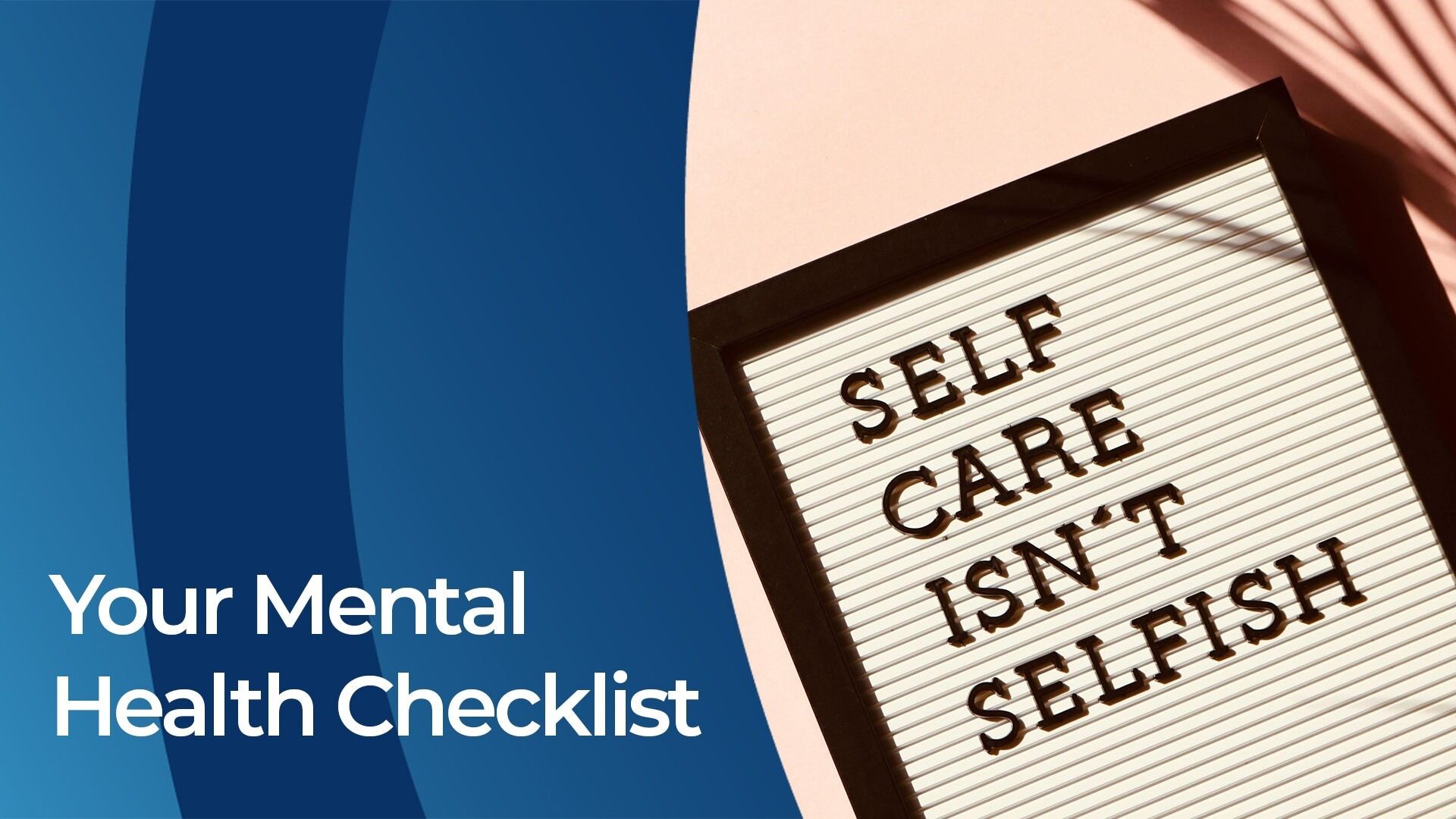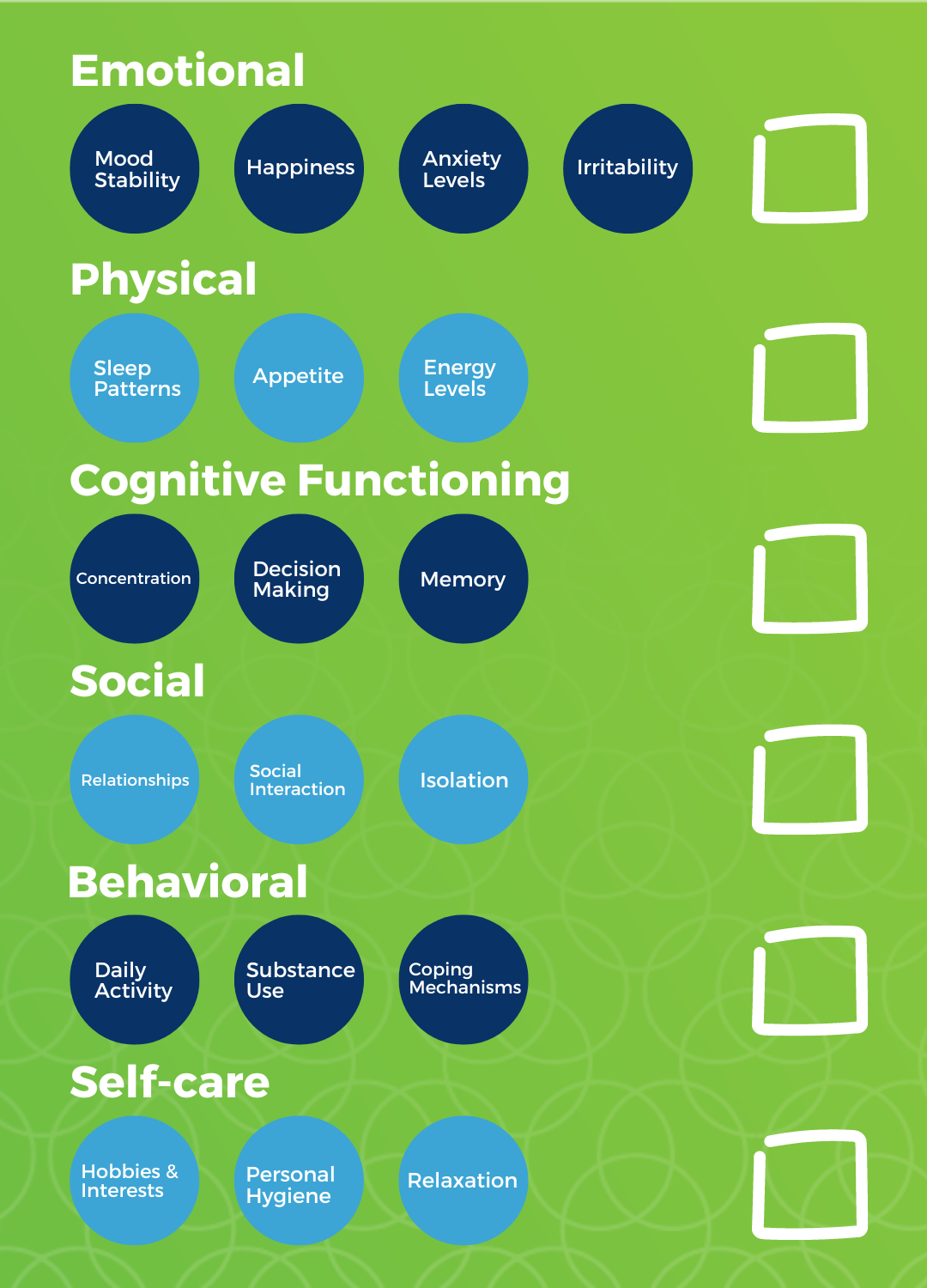Your Mental Health Checklist
Your Mental Health Checklist

Mental health today is more important than ever before. We are bombarded by stimulation from the moment we open our eyes in the morning to the moment we fall asleep, we are tapped into the digital world. This constant flurry of information wears on our minds and can contribute to, or worsen, existing mental health issues.
Because we have so much more exposure to stimulation, we also must more regularly check in with ourselves to evaluate how we are feeling, our stress levels, and the severity of our symptoms. A daily checklist is an excellent way to manage your mental health and protect yourself from crises.
In this post, we have created a mental health checklist covering multiple areas of mental health to help you get in touch with your body and mind. We will include a checklist for emotional well-being, physical well-being, cognitive functioning, social well-being, behavioral changes, and self-care. Keep reading to learn more!
Assessing Your Mental Health Needs
Everyone should set aside a few minutes per day to assess their mental health. However, when we are managing a mental health episode or full-blown panic attack, it can be challenging in the moment. To help you make your mental health check-ins more manageable, below we have included a few checklists to provide you with a structured formula for assessing your mental health

Emotional Well-Being Checklist
-
Mood Stability: My mood is stable and calm. I have not experienced intense emotional fluctuations or sudden rising periods of panic.
-
Happiness: I feel content today. I do not feel as though there is a welling sense of urgency to make big or sudden life changes.
-
Anxiety Levels: I am not feeling intense stress or worry. I am not fixating on scenarios or dwelling on previous events that cause me grief.
-
Irritability: My interactions with others have not caused me to feel anger without proper cause. My thoughts are passive and calm during these interactions and I am not quick to judgment.
Physical Well-being
-
Sleep Patterns: I have been sleeping every night, throughout the night, without frequently waking.
-
Appetite: I have consistently been eating three meals per day and look forward to mealtime. Food does not feel like a chore.
-
Energy Levels: I feel as though I have enough energy to tackle my daily tasks. Simple things like cooking, cleaning, and bodily maintenance are not a burden.
Cognitive Functioning
-
Concentration: I can focus on the task in front of me without my mind wandering or reeling with worry.
-
Decision Making: I can make firm decisions and follow through on them. I am not constantly second-guessing myself or flipping between decisions.
-
Memory: I can remember most of the day's events when reflecting on them. There are no long gaps in my memory.
Social Well-being
-
Relationships: I am making time to see or talk with my friends and family. I take joy out of these mutually respectful relationships and look forward to seeing my loved ones.
-
Social Interaction: I can socially interact with others without feeling stress. I can have conversations with strangers and freely go out in public.
-
Isolation: I find it easy to leave the house and do so at least once a day. There are not long periods where I feel the need to hide away from others or close myself off.
Behavioral Changes
-
Daily Activities: I have a set list of chores or responsibilities that I do every day. I accomplish these tasks and they do not wear on me.
-
Substance Use: If I use intoxicants, like alcohol, my use is moderate, and I never try to bury my feelings or dilute my mind.
-
Coping Mechanisms: I have a set list of healthy coping mechanisms that I use to overcome my grief and worries. If they are not working, I reach out for help.
Self-care
-
Hobbies and Interests: I have multiple interests and hobbies that I spend time on a few hours every week.
-
Personal Hygiene: For me, personal hygiene and grooming are daily tasks. They are not a struggle, and I find that these tasks improve my mood.
-
Relaxation: I set aside time every day to focus on relaxing. During these times I am not overcome with worry.
Mental Health Support from Child Focus
Mental health is a serious issue in today's world. Almost everyone faces mental health challenges at one point or another, and the constant barrage of media that surrounds us often contributes to worsening issues.
If you have been struggling with your mental health, Child Focus is here to help. We offer dedicated and group therapy sessions designed to help you and your loved ones discover sustainable mental health stability.
Click here to learn more!
For more tips on how to help your family thrive, follow Child Focus on Facebook, X, Instagram, and LinkedIn today!
Has Child Focus made a difference in your life or the life of someone you care about? Leave Us A Quick Review Here!
